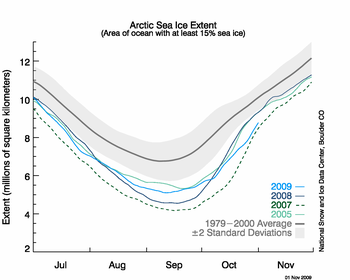How unstable the climate can be
Perhaps I take these possibilities more seriously than some because I have actually seen examples firsthand.
In the spring of '82, El Chichon erupted in Mexico.
My cousin and I were in Hawaii. She called me up and said "Doesn't it seem like the volcano is erupting? We are having asthma attacks."
"Yes," I said "but the volcanoes on the Big Island are not erupting... what's going on?"
Sure enough, it was the sulfur dioxide all the way from Mexico. The cloud spread over a large part of the Pacific. The sky in Hawaii was milky white. I went out at noon in June, closed my eyes, and could not feel the heat from the Sun! It was astounding. See graph on the right.
http://en.wikipedia.org/wiki/El_Chichón
When I was growing up in Hawaii, even though I lived on the leeward side of Oahu, which is technically a desert, it was not too hot and it rained often enough.
In 1977, the Pacific Decadal Oscillation switched to its other state. Suddenly, in the early '80s WE DID NOT HAVE ANY RAIN ON OAHU FOR AN ENTIRE YEAR. The trees died. It was unbelievable, and it was like someone had flipped a switch. This went on for nearly 30 years. Finally, it has switched back to it's other state, so hopefully we will have a few decades of good weather and rain again like when I was little.
http://en.wikipedia.org/wiki/Pacific...al_oscillation
Things are pretty good the way they are now. For almost the entirety of its history, the climate of the Earth was far less pleasant.
It is possible for the seas to become a stagnant mess if the poles melt. Everything dies (I'm not joking or exaggerating).
This is well worth watching.
http://www.abc.net.au/science/crude/
Originally posted by Dr.No
View Post
In the spring of '82, El Chichon erupted in Mexico.
My cousin and I were in Hawaii. She called me up and said "Doesn't it seem like the volcano is erupting? We are having asthma attacks."
"Yes," I said "but the volcanoes on the Big Island are not erupting... what's going on?"
Sure enough, it was the sulfur dioxide all the way from Mexico. The cloud spread over a large part of the Pacific. The sky in Hawaii was milky white. I went out at noon in June, closed my eyes, and could not feel the heat from the Sun! It was astounding. See graph on the right.
http://en.wikipedia.org/wiki/El_Chichón
When I was growing up in Hawaii, even though I lived on the leeward side of Oahu, which is technically a desert, it was not too hot and it rained often enough.
In 1977, the Pacific Decadal Oscillation switched to its other state. Suddenly, in the early '80s WE DID NOT HAVE ANY RAIN ON OAHU FOR AN ENTIRE YEAR. The trees died. It was unbelievable, and it was like someone had flipped a switch. This went on for nearly 30 years. Finally, it has switched back to it's other state, so hopefully we will have a few decades of good weather and rain again like when I was little.
http://en.wikipedia.org/wiki/Pacific...al_oscillation
Things are pretty good the way they are now. For almost the entirety of its history, the climate of the Earth was far less pleasant.
It is possible for the seas to become a stagnant mess if the poles melt. Everything dies (I'm not joking or exaggerating).
This is well worth watching.
http://www.abc.net.au/science/crude/


Comment